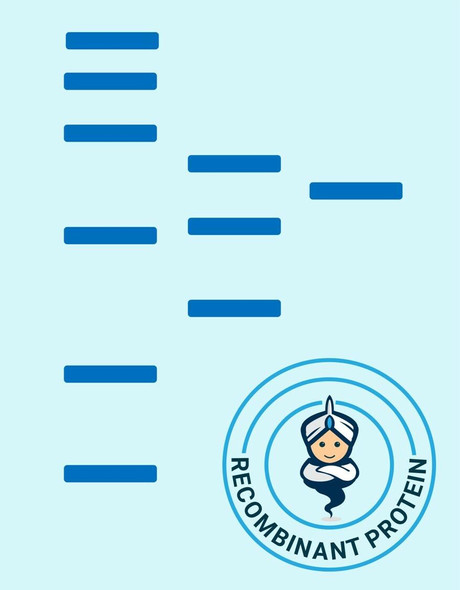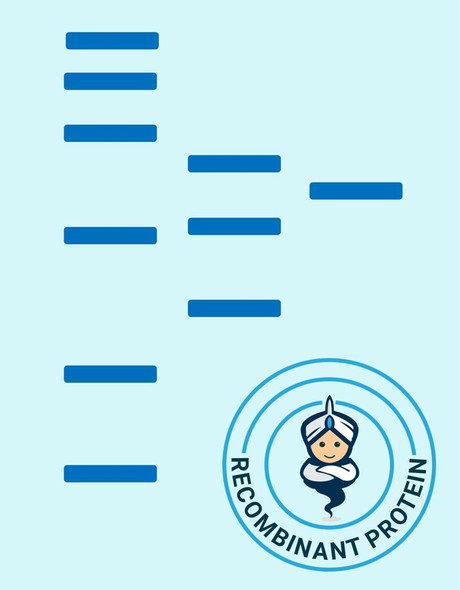Description
| Product Name: | Human CDK-4 Recombinant Protein |
| Product Code: | RPPB2462 |
| Size: | 10µg |
| Species: | Human |
| Target: | CDK-4 |
| Synonyms: | Cell division protein kinase 4, CDK4, EC 2.7.11.22, Cyclin-dependent kinase 4, PSK-J3, CMM3,CDK-4, MGC14458. |
| Source: | Escherichia Coli |
| Physical Appearance: | Sterile Filtered clear solution. |
| Formulation: | CDK4 is supplied in 10mM Bis-Tris Propane pH9.0 and 50% Glycerol. |
| Stability: | Store at 4°C if entire vial will be used within 1-2 weeks.�Store, frozen at -20°C for longer periods of time.�Avoid multiple freeze-thaw cycles. |
| Purity: | Greater than 95% as determined by SDS-PAGE. Single band on Western Blot. |
Cyclin-dependent kinase 4 combines with the protein cyclin D to form a protein complex that promotes the passage of cells through the G1 checkpoint in the cell growth cycle. This cellular activity is regulated by the protein p16 produced by p16INK4a. Normally, p16 controls cell growth by inhibiting the activity of the CDK4�cyclin D complex and stopping cells at the G1 checkpoint.
Cyclin-Dependent Kinase 4 Human Recombinant is expressed in E. coli as a full-length protein having a molecular weight of 38 kDa fused to an amino terminal hexahistidine tag. The CDK4 is purified by proprietary chromatographic techniques.
| UniProt Protein Function: | CDK4: a protein kinase of the CDK family that is important for cell cycle G1 phase progression. Its activity is restricted to the G1-S phase. Controlled by the regulatory subunits D-type cyclins and CDK inhibitor p16(INK4a). Phosphorylates the retinoblastoma gene product (Rb). Point mutations found in somatic and familial melanoma. Amplified in sarcomas, glioma and lymphoma. Amplified, methylated or deleted in head and neck squamous cell carcinoma. Overexpression drives epithelial tumors in mice. Disruption makes mice resistant to cancer. Inhibitor: PD332991. |
| UniProt Protein Details: | Protein type:EC 2.7.11.22; Kinase, protein; Protein kinase, CMGC; Cell cycle regulation; Protein kinase, Ser/Thr (non-receptor); CMGC group; CDK family; CDK4 subfamily; CDK/CDK4 subfamily Chromosomal Location of Human Ortholog: 12q14 Cellular Component: nucleoplasm; transcription factor complex; nuclear membrane; tight junction; perinuclear region of cytoplasm; nucleolus; cyclin-dependent protein kinase holoenzyme complex; nucleus; chromatin; cytosol Molecular Function:protein binding; cyclin binding; cyclin-dependent protein kinase activity; protein complex binding; cyclin-dependent protein kinase regulator activity; ATP binding Biological Process: circadian rhythm; lens development in camera-type eye; response to drug; establishment and/or maintenance of chromatin architecture; organ regeneration; positive regulation of cell size; positive regulation of translation; positive regulation of apoptosis; response to toxin; response to testosterone stimulus; signal transduction; protein amino acid phosphorylation; positive regulation of fibroblast proliferation; response to hyperoxia; regulation of gene expression; cell division; response to lead ion; positive regulation of cell proliferation; mitotic cell cycle; regulation of protein kinase activity; G1/S transition of mitotic cell cycle Disease: Melanoma, Cutaneous Malignant, Susceptibility To, 3 |
| NCBI Summary: | The protein encoded by this gene is a member of the Ser/Thr protein kinase family. This protein is highly similar to the gene products of S. cerevisiae cdc28 and S. pombe cdc2. It is a catalytic subunit of the protein kinase complex that is important for cell cycle G1 phase progression. The activity of this kinase is restricted to the G1-S phase, which is controlled by the regulatory subunits D-type cyclins and CDK inhibitor p16(INK4a). This kinase was shown to be responsible for the phosphorylation of retinoblastoma gene product (Rb). Mutations in this gene as well as in its related proteins including D-type cyclins, p16(INK4a) and Rb were all found to be associated with tumorigenesis of a variety of cancers. Multiple polyadenylation sites of this gene have been reported. [provided by RefSeq, Jul 2008] |
| UniProt Code: | P11802 |
| NCBI GenInfo Identifier: | 1168867 |
| NCBI Gene ID: | 1019 |
| NCBI Accession: | P11802.2 |
| UniProt Secondary Accession: | P11802,O00576, Q6FG61, B2R9A0, B4DNF9, |
| UniProt Related Accession: | P11802 |
| Molecular Weight: | Calculated MW: 20kDa/33kDaObserved MW: 34kDa |
| NCBI Full Name: | Cyclin-dependent kinase 4 |
| NCBI Synonym Full Names: | cyclin-dependent kinase 4 |
| NCBI Official Symbol: | CDK4�� |
| NCBI Official Synonym Symbols: | CMM3; PSK-J3�� |
| NCBI Protein Information: | cyclin-dependent kinase 4; cell division protein kinase 4 |
| UniProt Protein Name: | Cyclin-dependent kinase 4 |
| UniProt Synonym Protein Names: | Cell division protein kinase 4; PSK-J3 |
| Protein Family: | Cyclin-dependent kinase |
| UniProt Gene Name: | CDK4�� |
| UniProt Entry Name: | CDK4_HUMAN |










